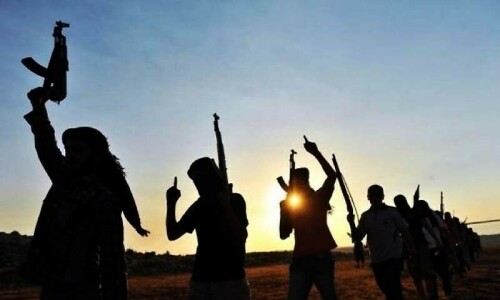KABUL: The United States has made no decision on whether to transfer Taliban prisoners from Guantanamo Bay to help revive Afghan peace talks, but saw signs that insurgent hostility to peace talks may be splintering, Washington's new Kabul envoy said on Monday.
US Ambassador James Cunningham also urged Pakistan to play a “positive, cooperative” role in nurturing a reconciliation that the Taliban suspended in March after accusing US officials of failing to honour confidence-building promises.
Afghan officials revealed this week they had held secret talks with the Taliban's former second in command who is in detention in Pakistan in a move which could help rekindle negotiations aimed at ending the 11-year Afghan war.
“We see reflections. There are a number of moving pieces that are possible,” Cunningham told reporters. “We haven't made any decisions in any way, shape or form as far as I know about any transfers,” he said.
Supporters of the prisoner exchange, a trust-building measure suggested in initial discussions between US negotiators and Taliban officials, say a deal could open a door
to peace talks between the Taliban and Afghan President Hamid Karzai's government, derided by militants as US “stooges”.
Sources in US administration told Reuters this month the United States could alter the sequence of the move of five senior Taliban figures held for years at the US military prison to the Gulf state of Qatar to give talks new momentum.
At the same time Rangin Spanta, Karzai's national security adviser and peace-building envoy, said an Afghan delegation had met the Taliban's former military wing commander, Mullah Abdul Ghani Baradar, in Pakistan two months ago.
“There are a number of different elements at play, none of them are yet definitive or creating any concrete way forward,” said Cunningham, a former US ambassador to Israel.
“There are contacts taking place, mostly at this point with Afghans, among Afghans, Taliban and Afghans ... and as a result of these contacts, that there is some rethinking going on among the Taliban about the future choices that they face,” he said.
PAKISTAN ROLE
Afghan officials have publicly been demanding access to Baradar, who has been in detention since he was captured in a joint operation by the CIA and Pakistani intelligence agents in the Pakistani city of Karachi in 2010.
But Spanta's admission revealed that preliminary contact had already been made, a move which could improve Islamabad's fragile cross-border ties with Kabul, but anger insurgent factions within both countries.
Rehman Malik, Pakistan's interior minister, also said that Pakistan had granted Afghan officials access to Baradar.
Pakistan is seen as crucial to stability in Afghanistan as most foreign combat troops look to leave the country in 2014, given close political and economic ties and because militant sanctuaries straddle the mountainous border.
Cunningham, a career diplomat who replaced veteran US envoy Ryan Crocker, said Pakistan “obviously has a role to play” in any peace process.
“We and the Afghans who are in the lead in this have had a thorough discussion with them, which is continuing, about things that they can do to promote the process,” he said.
With the US and other Western donors having agreed a patchwork of strategic deals with Karzai's government to guarantee a reduced international presence in Afghanistan and continuing aid, Cunningham said the framework was in place for improvements in Afghanistan ahead of the 2014 drawdown.
But he said there were still myriad security challenges, particularly in the volatile east of the country, and described a rash of recent killings of foreign soldiers by uniformed Afghan allies as “lamentable”.
“I don't know if anybody can assess what the effect on morale is, or the impact is, but it's obviously very troubling,” said Cunningham, whose biggest challenge will be talks on a pact for a continuing but smaller US troop presence in the country.
So far in 2012 there have been 27 rogue attacks, called “green on blue incidents” by NATO-led forces, with 37 foreign troops killed by Afghan police or soldiers, as well as other incidents involving contractors employed by the coalition.
An Afghan policeman opened fire on NATO troops on Monday in the Achin district of eastern Nangarhar province, wounding two US soldiers and an Afghan intelligence service soldier.
















































Dear visitor, the comments section is undergoing an overhaul and will return soon.